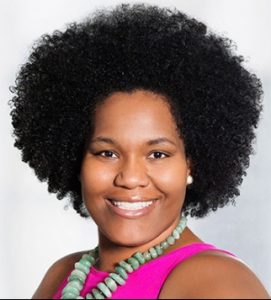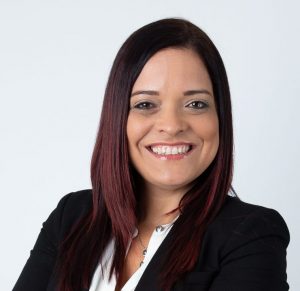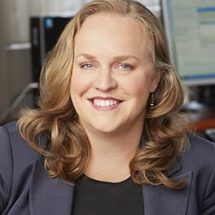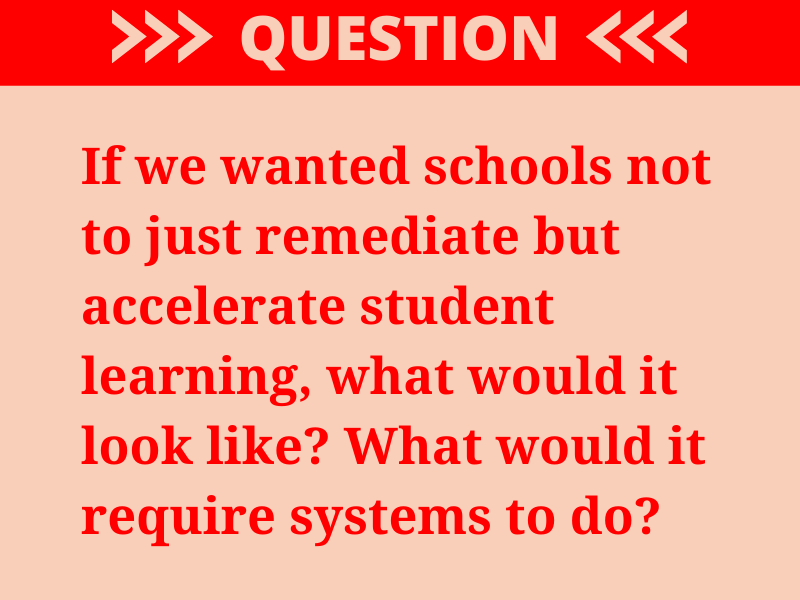Reality Check: What Will It Take to Reopen Schools Amid the Pandemic? 5 Experts Weigh In on Accelerating Student Learning

This is the seventh in a series of invited responses to some of the big, unanswered questions facing America’s schools as they prepare to reopen in the fall. The Center on Reinventing Public Education, in partnership with The 74, fielded responses from a diverse roster of educators and policymakers in order to promote creative thinking and debate about how we can collectively meet student needs in an extraordinarily challenging school year, and beyond. You can see previous installments here.
Our schools needed to accelerate learning even before the pandemic
By Kenya Bradshaw
 First, we have to acknowledge that although students have been out of school since March, many were behind grade level already. COVID-19 did not cause our children to fall behind. Years of educational neglect and lack of intervention did that. People at all levels of the system bear the responsibility, not just teachers.
First, we have to acknowledge that although students have been out of school since March, many were behind grade level already. COVID-19 did not cause our children to fall behind. Years of educational neglect and lack of intervention did that. People at all levels of the system bear the responsibility, not just teachers.
One of the biggest reasons students fall behind is that schools consistently have given them below-grade-level content and failed to use research-backed instructional practices. In our 2018 study, The Opportunity Myth, we found that most students don’t get grade-level assignments day in and day out, even though most students can rise to the challenge of grade-level material when they’re given the chance. And states like Mississippi have made impressive gains by focusing on instruction grounded in the science of reading.
Helping students get back to grade level starts with rejecting the typical approach to remediation, in which students spend most or all of the year on content from previous grades. Schools don’t need to fill in every gap from the previous grade — just the skills and knowledge that are most important to engaging with grade-level work right away. And rather than spending big chunks of the year just on reteaching that content, schools need to find ways to do that reteaching when it’s needed, alongside the grade-level curriculum. For example, a first-grade teacher would want to prioritize filling in important gaps from kindergarten math, like adding within 10, as part of the important first-grade skill of adding within 20. That would mean spending less time on less-essential skills, like telling time on an analog clock.
Beyond academics, schools need to focus on partnering with students and families to ensure that their voices are heard as they make decisions for the year ahead. And system leaders need to address inequity head-on by acknowledging that students of color are the least likely to receive grade-appropriate assignments and strong instruction even under normal circumstances, and setting up controls to ensure equitable access to those critical resources.
Kenya Bradshaw is TNTP’s vice president of policy and community coalitions.
Acceleration and individualization — not remediation — are necessary
By Sonja Santelises
 We know we will not be able to remediate our way out of the academic ground that our students lost this spring due to the COVID-19 pandemic. Our focus will instead be on accelerating student learning in the fall.
We know we will not be able to remediate our way out of the academic ground that our students lost this spring due to the COVID-19 pandemic. Our focus will instead be on accelerating student learning in the fall.
First, we believe that all students need consistent access to grade-level content. Unfinished learning will be addressed by prioritizing critical foundational skills. We will adapt the scope and sequence pacing guides to ensure that essential grade-level content is prioritized and that students are exposed to that grade-appropriate content starting at the beginning of the school year.
Diagnostic testing will also be critical to identifying skills and gaps in essential foundational standards in order to support teachers in understanding where students are in their learning and so that they can provide the appropriate scaffolds to make work accessible for students to master those standards. Data will also be used to guide small-group instruction, which will be essential for student growth and mastery.
Finally, students will have individualized learning plans informed by those diagnostics and student work. Ongoing progress monitoring of those plans will be essential to inform instructional decisions throughout the course of the year.
This will be a challenge in the 100 percent virtual or blended-learning settings that will likely be our reality in the fall. Teachers will need to monitor and assess students individually and quickly readjust to address students’ needs. Consequently, teachers will need clear learning plans, supplemented by ongoing support and coaching. They will also need to be supported with ongoing professional learning and best practices for virtual and blended learning.
In addition, all students will need to experience deep relationships to ensure that they are cared for, seen, heard and engaged in school. We found in the virtual environment this spring that the relationships our students and families had with their schools were critical to the consistent engagement of students in learning, which will be even more important in the fall if we are working to accelerate that learning. We will also have to continue our family engagement efforts, focusing on building the capacity of families to support their children’s learning at home.
We believe that the combination of these various components will be necessary to accelerate student learning so that our children can grow and thrive in this new reality.
Sonja Santelises is CEO of Baltimore City Public Schools.
We need to help families support all students to make the most of learning at home
By Bárbara Rivera Batista
 Students and families living in economic disadvantage are more vulnerable to academic gaps, socioemotional challenges and adverse circumstances within their households. Our education systems should be prepared to address not only academic gaps but also the socioemotional impact of living in poverty and the impact of external events such as COVID.
Students and families living in economic disadvantage are more vulnerable to academic gaps, socioemotional challenges and adverse circumstances within their households. Our education systems should be prepared to address not only academic gaps but also the socioemotional impact of living in poverty and the impact of external events such as COVID.
Ensuring resilient schools and teams, and preparing everyone to address trauma and to be empathic and sensitive to trauma, are important to understanding each student’s reality and accelerate learning.
Schools should have differentiated instruction that allows each student to move progressively, receiving what they need to learn and develop at their level. We need to ensure that students can manage remote education in an appealing, fun and meaningful way — but, at the same time, with quality standards that ensure rigor and depth.
We have seen the importance of creating a study environment at home and ensuring parental support for distance learning. Giving them the tools to do this is central to our efforts. Helping families understand how to prepare a space in the home, how to use technology and how to enjoy family learning will become part of our teaching and learning efforts. Ensuring integrated and in-context learning will enable its sustainability.
We are seeing many students thriving in this remote environment, making connections to prior or new learning, and applying their knowledge in their daily home lives. As teachers have focused on building opportunities for students to practice life skills and apply their learning with household tasks and objects, we have seen that the transfer of learning is more powerful and sustained for kids.
As we continue with remote, hybrid or in-person learning, we are looking to pay closer attention to how we encourage students to demonstrate their understanding of key content and skills and to give them some choices with how they represent their knowledge so they can find meaning and use in their daily life.
Education models need to reflect the demand for lifelong learning to cope with the technological and social changes we face. The education system must take into consideration the knowledge and skills students will need to compete in the global economy. Now more than ever, education adaptability needs to occur fast. Education needs to respond to a new reality.
Bárbara Rivera Batista is director of Vimenti School, an initiative of the Boys and Girls Clubs of Puerto Rico and the first public charter school on the island.
All students deserve to be challenged
By Cami Anderson
 Schools and systems must actively guard against approaches based on stereotypes and generalizations — like assuming that all kids living in poverty, or Black students, or students with disabilities or kids who may have been struggling previously are worse off now.
Schools and systems must actively guard against approaches based on stereotypes and generalizations — like assuming that all kids living in poverty, or Black students, or students with disabilities or kids who may have been struggling previously are worse off now.
This kind of deficit thinking and pathologizing of students and families permeates too many practices and policies. The truth: Many students have been thriving — now that they can work at their own pace, in their own way, and are free from complicated and biased school cultures.
At the same time, many students have struggled without a regular connection to skillful educators and caring peers. Our approach to these students cannot simply be to help them “catch up.” Rather, students should feel like “I am working hard, and it is so interesting. I see myself in the materials, and I am excited to do the work.” Research is clear: Approaches that feel more like “gifted and talented” programs, characterized by high expectations and meaningful work, get results for students at all levels, as opposed to “remedial programs” characterized by dumbing down and rote memorization.
During this pandemic, some low-income families may want more and harder schoolwork — not less — and they should be able to get it.
Students must also feel seen, heard, motivated and challenged in order to learn. Too few students — particularly Black, Hispanic, LGBTQIA and those with disabilities — felt this way pre-COVID. We can’t repair relationships that were never built. This work has to take center stage with as much focus and resources as the push to ensure that all students have access to high-quality instructional materials.
Educators’ jobs have fundamentally changed — and we can’t act as if this isn’t true. They deserve time to really dig into the content, to take great tools and make them their own, and to collectively problem-solve in this new world. We can’t teach everything, and we shouldn’t try to. Experts have identified a smaller set of essential and prioritized grade-level skills for English Language Arts and math. School systems should adopt these power standards and select or amend the best online and in-person resources to teach them.
This summer and fall, while we have a pause in the action in school buildings across the country, school system leaders need to prioritize high-quality educator training around developing relationships and navigating struggle, difference and conflict.
This will require doing four things: paring down standards to prioritize must-cover content, investing in high-quality adult training, monitoring progress and adjusting, and prioritizing trusting relationships with students and families.
In some cases, this will require major shifts in curriculum, assessments and teacher professional development. School system leaders should be courageous in making these choices and not revert to the status quo during a crisis.
Cami Anderson leads ThirdWay Solutions, an organization that supports policy, government, nonprofit, corporations and philanthropies dedicated to equity and justice, and The Discipline Revolution Project, helping traditional and charter systems radically rethink their approach to student discipline. She was previously superintendent of schools in Newark.
To accelerate learning, match teachers with their passions
By Julie Kennedy
 Way back in the day, I taught a middle school science unit on matter. Those tweens and I moved from atoms to endothermic reactions in 15 days. Our classroom hummed with elegant efficiency and deep thinking. A few units later, we’d slog our way through phases of the moon, with multiple days spent trying to position a flashlight in the room to demonstrate that the moon doesn’t actually emit light. It was brutal. Our elegant efficiency was nowhere to be seen. Deep thinking was nonexistent.
Way back in the day, I taught a middle school science unit on matter. Those tweens and I moved from atoms to endothermic reactions in 15 days. Our classroom hummed with elegant efficiency and deep thinking. A few units later, we’d slog our way through phases of the moon, with multiple days spent trying to position a flashlight in the room to demonstrate that the moon doesn’t actually emit light. It was brutal. Our elegant efficiency was nowhere to be seen. Deep thinking was nonexistent.
The difference between those two units? My undergrad chemistry degree and deep love for all things atomic (as compared to every other unit I taught).
It’s no surprise that deep content knowledge is a key factor in our ability to simultaneously remediate and accelerate student learning. Elegant efficiency and deep thinking require the kind of content knowledge that allows teachers to teach as if they’re the equivalent of an energy bar: just enough flavor to make it tasty, but expertly compiled for efficient consumption.
After decades of working with schools, I know it’s silly to imagine finding or developing teachers with energy-bar knowledge of everything they’re expected to teach. But what if we reimagined how we assign our teachers?
Instead of Mrs. Kennedy teaching “fourth-grade math,” I’m now the “upper elementary school geometry expert.” I rotate among third, fourth and fifth grades and teach all the geometry units. Maybe I’m a geometry savant, or maybe I just find it wildly interesting and spend my spare time really zeroing in on what it means to evolve as a third-through-fifth-grade mathematician in geometry. It takes some creative thinking to extend this thought experiment to other content areas.
To cultivate and leverage depth of knowledge in English, perhaps a teacher becomes the expert in “word recognition” and zeroes in on that as students engage with texts? Perhaps school leaders leverage the teacher who is most skilled at moving student writing ability to spend a quarter with each grade level?
It would be thrilling to see how we could reimagine scheduling and teaching assignments to creatively unlock and leverage the spikes in each teacher’s content knowledge, where their passion and expertise jump off the charts compared with their colleagues. And maybe we can move closer to the elegant efficiency and deep thinking that now only happens, in many classrooms, during a few units per year.
Julie Kennedy leads the academic and character practice on the Impact Team at the charter school growth fund. She began her career as a middle school science teacher in Newark and Boston.
Get stories like these delivered straight to your inbox. Sign up for The 74 Newsletter

;)
